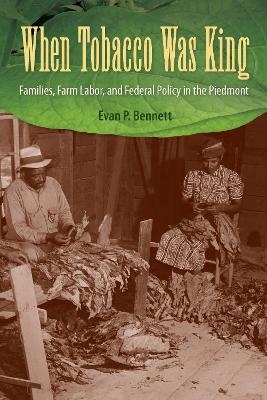
When Tobacco Was King
Families, Farm Labor, and Federal Policy in the Piedmont
Seiten
2024
University Press of Florida (Verlag)
978-0-8130-8056-7 (ISBN)
University Press of Florida (Verlag)
978-0-8130-8056-7 (ISBN)
Traces the American South’s history from Emancipation to the abandonment of federal crop controls in 2004 and highlights the transformations endured by blacks and whites, landowners and tenants, to show how tobacco farmers continued to find meaning and community in their work despite drastic changes.
Tobacco has left an indelible mark on the American South, shaping the land and culture throughout the twentieth century. In the last few decades, advances in technology and shifts in labor and farming policy have altered the way of life for tobacco farmers: family farms have largely been replaced by large-scale operations dependent on hired labor, much of it from other shores. However, the mechanical harvester and the H-2A guestworker did not put an end to tobacco culture but rather sent it in new directions and accelerated the change that has always been part of the farmer’s life.
In When Tobacco Was King, Evan Bennett examines the agriculture of the South’s original staple crop in the Old Bright Belt--a diverse region named after the unique bright, or flue-cured, tobacco variety it spawned. He traces the region’s history from Emancipation to the abandonment of federal crop controls in 2004 and highlights the transformations endured by blacks and whites, landowners and tenants, to show how tobacco farmers continued to find meaning and community in their work despite these drastic changes.
Tobacco has left an indelible mark on the American South, shaping the land and culture throughout the twentieth century. In the last few decades, advances in technology and shifts in labor and farming policy have altered the way of life for tobacco farmers: family farms have largely been replaced by large-scale operations dependent on hired labor, much of it from other shores. However, the mechanical harvester and the H-2A guestworker did not put an end to tobacco culture but rather sent it in new directions and accelerated the change that has always been part of the farmer’s life.
In When Tobacco Was King, Evan Bennett examines the agriculture of the South’s original staple crop in the Old Bright Belt--a diverse region named after the unique bright, or flue-cured, tobacco variety it spawned. He traces the region’s history from Emancipation to the abandonment of federal crop controls in 2004 and highlights the transformations endured by blacks and whites, landowners and tenants, to show how tobacco farmers continued to find meaning and community in their work despite these drastic changes.
Evan P. Bennett is associate professor of history at Florida Atlantic University. He is the author of Tampa Bay: The Story of an Estuary and Its People and coeditor of Beyond Forty Acres and a Mule: African American Landowning Families since Reconstruction.
| Erscheinungsdatum | 22.03.2024 |
|---|---|
| Verlagsort | Florida |
| Sprache | englisch |
| Maße | 152 x 229 mm |
| Gewicht | 272 g |
| Themenwelt | Sachbuch/Ratgeber ► Geschichte / Politik ► Regional- / Landesgeschichte |
| Geisteswissenschaften ► Geschichte ► Allgemeine Geschichte | |
| Geisteswissenschaften ► Geschichte ► Regional- / Ländergeschichte | |
| Geschichte ► Teilgebiete der Geschichte ► Wirtschaftsgeschichte | |
| Weitere Fachgebiete ► Land- / Forstwirtschaft / Fischerei | |
| ISBN-10 | 0-8130-8056-8 / 0813080568 |
| ISBN-13 | 978-0-8130-8056-7 / 9780813080567 |
| Zustand | Neuware |
| Informationen gemäß Produktsicherheitsverordnung (GPSR) | |
| Haben Sie eine Frage zum Produkt? |
Mehr entdecken
aus dem Bereich
aus dem Bereich
Macht und Herrschaft im Zarenreich
Buch | Hardcover (2024)
C.H.Beck (Verlag)
49,90 €
wie die USA und China um die technologische Vorherrschaft auf der …
Buch | Hardcover (2023)
Rowohlt (Verlag)
30,00 €


